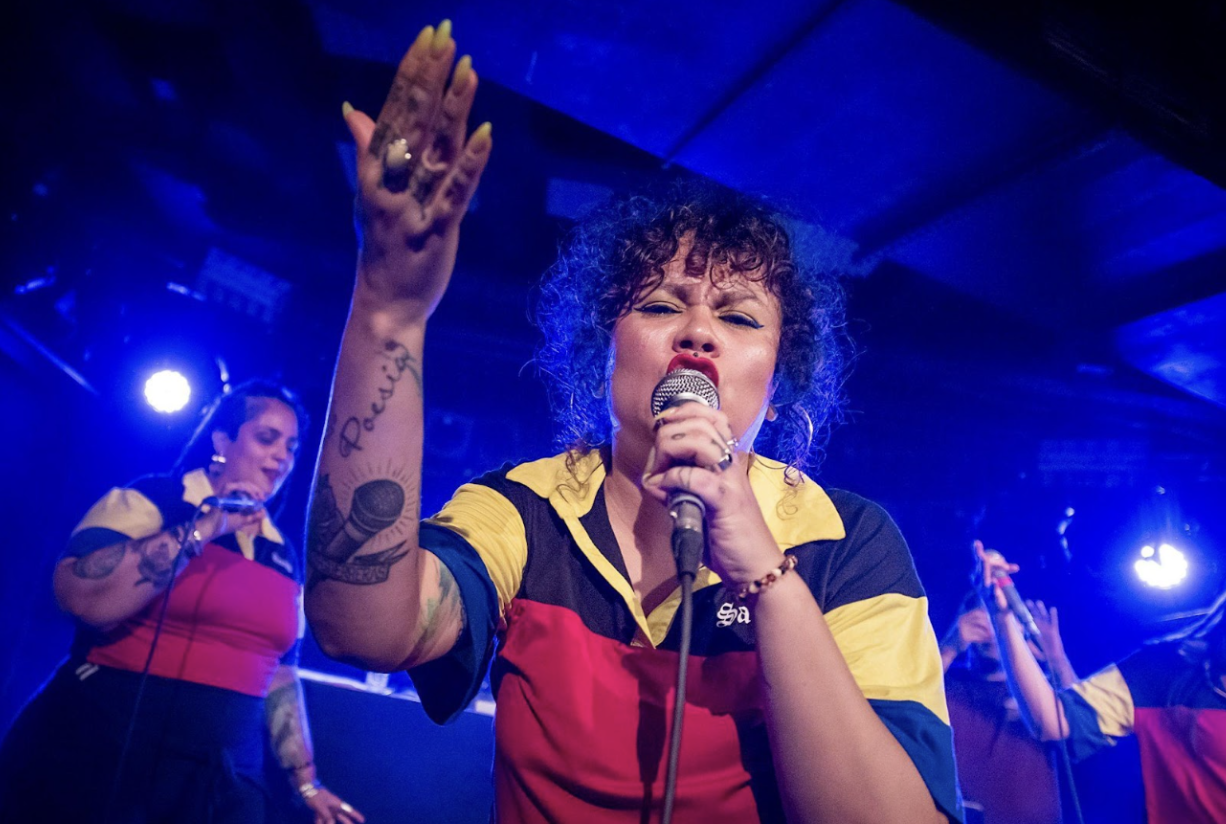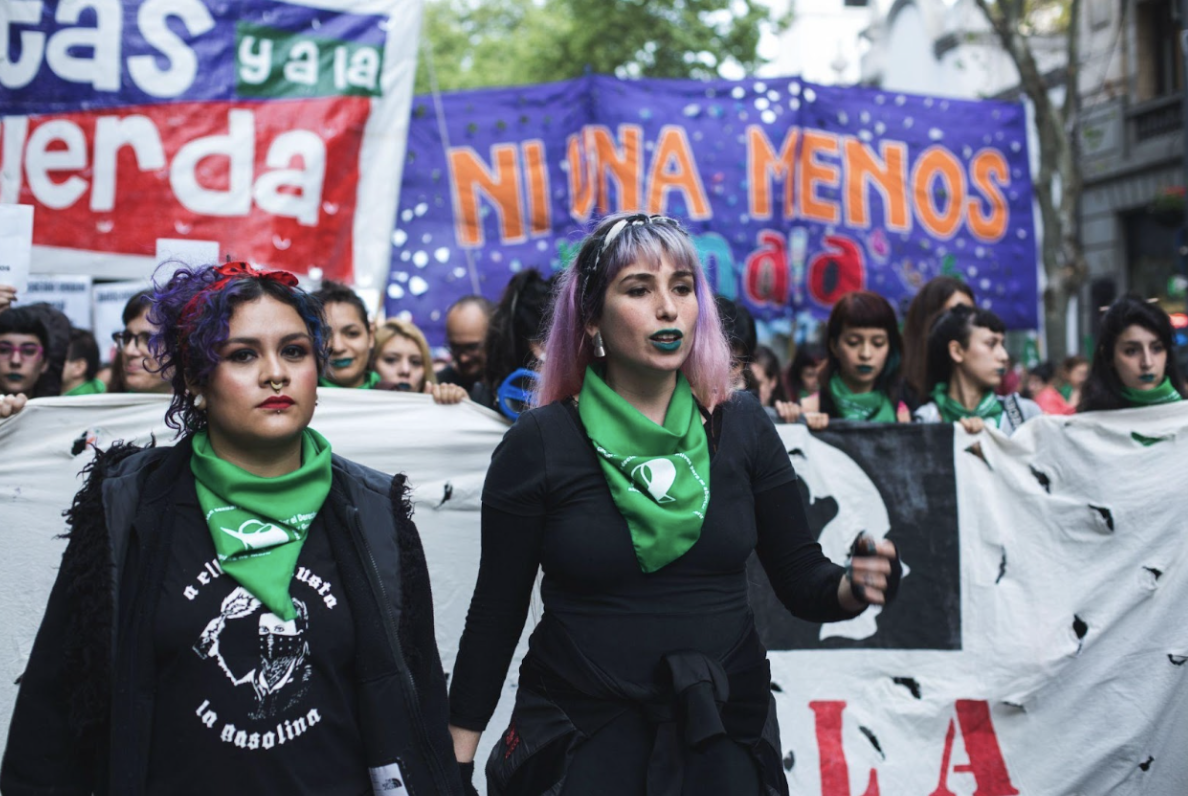Rebeca Lane
Musician
Guatemala

Over the last decade, Guatemalan musician and activist Rebeca Lane has educated a generation of women across Latin America about feminism, activism, and reclaiming their place in a patriarchal society that has too often oppressed and violated them.
Lane’s career as an artist and activist has been profoundly shaped by her family’s history and their experiences during the Guatemalan civil war, fought between the government and opposition groups from 1960 to 1996. The government was widely condemned for committing human rights abuses against civilians, including a genocide against the indigenous Maya people. An estimated 200,000 people were killed or forcefully disappeared during the conflict.
Only a few years before Lane was born in 1984, one of her aunts was disappeared, her uncle was kidnapped, and another uncle was killed. Lane was 12 years old when the war came to an end. When she later entered university, she quickly became involved in young anarchist and feminist movements—only to realize that she was still deeply affected by the collective trauma that she and so many of her fellow activists had experienced during childhood. “All these traumatic stories that we carried, we really didn’t have a way to get them out in a healthy way,” she recalls. “For me, activism was deepening these wounds and they were hurting even more.… Instead of being able to talk about all these issues in a way that would help us heal, there came a time when I said: ‘I no longer want to feel this hatred for the army, no longer I want to carry this hate with me. It’s harming me. I don’t want to act out of hate.’ This was hurting me personally a lot.”

Lane performs onstage in Berlin in 2018. Photo credit: Nika Kramer.
Seeking a creative outlet, Lane turned to the arts. She wrote a thesis about hip-hop in university and subsequently became involved in a number of artistic scenes, from hip-hop and rap to theater and poetry. “It all allowed me to talk about these issues and be listened to. And to listen to other people’s stories, too. And that made it very healing. Saying: ‘Oh, this didn’t just happen to me,’ or ‘I am not the only one who felt like this—this has also happened to other comrades.’ When you start to bring up your story and start to share it and you realize that there are shared stories, there is something very healing in that.”
“There are songs that I couldn’t sing at first because it hurt a lot to sing them. And after many years of singing them, I realized, this wound no longer hurts. Of course, that doesn’t mean that sometimes it doesn’t hurt again … but I am no longer the same person who began to sing full of rage, full of hate. That possibility was given to me by the arts.”
Through a combination of art and therapy, Lane found herself beginning to heal. “There are songs that I couldn’t sing at first because it hurt a lot to sing them,” she says. “And after many years of singing them, I realized, this wound no longer hurts. Of course, that doesn’t mean that sometimes it doesn’t hurt again … but I am no longer the same person who began to sing full of rage, full of hate. That possibility was given to me by the arts.”
A mix of rap and hip-hop, Lane’s music touches on myriad aspects of the female experience, from femicide and domestic violence to sexuality and the policing of women’s bodies and appearances. “When I discovered how to rap, the first thing I felt the need to talk about was my body … what it means to be a woman, and what being a woman has meant to me inside social movements,” Lane says. “I had a rupture with the social movement … when I came out of the closet as bisexual. I opened my eyes and realized that this was a super, super sexist space in which the few women who are there have to act like men to be taken into account.”
Lane regularly posts music videos on YouTube, where some of them have reached over two million views. Her songs are energetic, blunt, full of life and color, and at times unapologetically angry. “Ni una menos” (“Not a Woman Less), for example—a powerful anthem, released in 2018 in support of a regional women’s movement of the same name that erupted following the murder of a 14-year old girl in Argentina—opens with the following lyrics (translated from Spanish):
I’d like to have sweet things to write
But I have to decide and I choose anger
Today 5 women have been murdered
And at least 20 women are raped per hour
That’s just one day in Guatemala
Multiply it and you’ll know why we’re angry

Lane marches with other protesters at a rally in Buenos Aires in 2017. Photo credit: China Diaz
Lane’s music has resonated with thousands of Guatemalan women, introducing them to what it means to be a feminist. For Lane, the most powerful reactions to her songs come from young women. “I receive many comments from girls who tell me that they became interested in feminism because they listened to my music,” she says. “Of course, I’ve already had a 10-year career, so they tell me, ‘I’ve been listening to you since I was a child!’” Some of these fans, she adds, became “interested in participating as well.”
Lane says that people regularly come up to her after concerts, telling her that her music has helped them overcome difficult situations in life, and her YouTube videos are flooded with comments from people who thank her for helping them cope with depression or giving them the strength to leave a violent relationship. She also receives videos from people who have attended marches where her music was played in the street. “I think that the music I make does have an effect,” she says. And to her, “that’s all that matters!”
For Lane, the political and social themes of her music are inseparable from who she is as a person and an activist. She emphasizes that being an artist is her career and her tool for participating in social movements. “I am a person first,” she says. “Someone who seeks social transformation and through art finds a way of expressing it, a way of sustaining myself financially, and a way to create collective reflections. That’s where and how I place myself. I understand that just by making songs I won’t change the world, but it is what I can bring to the fight.”
To stay in tune with the movement, Lane regularly attends demonstrations—usually not as an artist but as a person. She does not typically perform at them unless organizers explicitly request it to attract a larger crowd. “I try to participate a lot as an observer, because it is from there that I start to create,” she says. “To observe what the girls are doing, how they are expressing it, what they are saying—to listen! Art accompanies social transformations, but art is not the social transformation… There has to be organization, political articulation, and alliances. And we in the arts accompany these transformations with what we create.”
Lane acknowledges that her shift from activist to artist came in part from a desire to limit her risk and exposure to repercussions. “I decided I don’t want to be killed,” she says. “In this art space they are not going to kill me, but in activism they will.” While Lane has never been explicitly censored in Guatemala, she has found herself excluded and ignored by the music scene, which she attributes to the feminist themes of her work. “They don’t invite me to events, despite the fact that I am one of the few artists in Guatemala who has a very long international career,” she says. “There is zero recognition from the world of music, art, industry… Or they recognize it, and as they know what I am doing, they are not interested in having me in their spaces. I play more concerts in other countries than in my own country.”
“They don’t invite me to events, despite the fact that I am one of the few artists in Guatemala who has a very long international career… There is zero recognition from the world of music, art, industry.… Or they recognize it, and as they know what I am doing, they are not interested in having me in their spaces. I play more concerts in other countries than in my own country.”
In 2021, Lane gave birth to a baby girl. She says that motherhood has profoundly reshaped her as an artist: what she feels comfortable saying in her music, the risks she is willing to take on, the events where she can or cannot perform, and the travel that she is able and willing to do. “I no longer feel free to do and say what I could do five years ago,” she says. Being a parent “gives me a lot of fear of the consequences of what this could mean for my relationship with my daughter. Having to grab your bags and leave because of a threat is not the same now.”
As a new mother, Lane has become increasingly interested in understanding her family’s history and the political context that has shaped them across generations. She has also felt compelled to interrogate these issues through her art. “This family history is linked to a country which has experienced wars and militarization,” she says. “The violence against children that we have so normalized comes from those stories of militarization that we carry. I’m thinking about raising my daughter…. Raising consciousness for me now is very important. This is where I want it to stop. This is where I want to cut this legacy of militarism in my family’s history and in the history of the country, because it is not only my family—it is the families of all us who inhabit this territory. I want to educate with love.”






